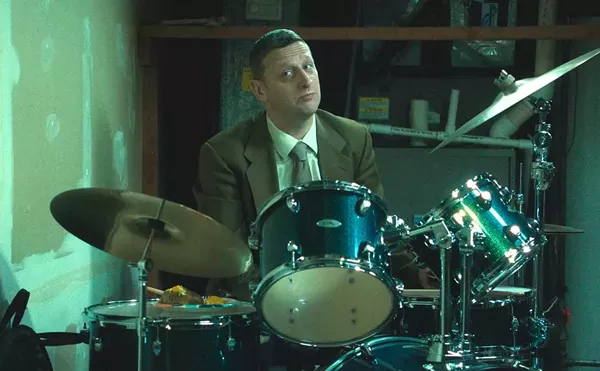
Audio By Carbonatix
[
{
"name": "GPT - Leaderboard - Inline - Content",
"component": "35519556",
"insertPoint": "5th",
"startingPoint": "3",
"requiredCountToDisplay": "3",
"maxInsertions": 100,
"adList": [
{
"adPreset": "LeaderboardInline"
}
]
}
]
Though the voting academy probably won't hand Mickey Rourke the Oscar for Best Actor (he spent 15 years burning bridges and pissing people off), his performance in Darren Aronofsky's The Wrestler has only one serious contender this year — Sean Penn in Milk. Unfortunately, Hollywood, true to its sentimental politicking, will probably end up honoring Clint Eastwood because, well, he's old, beloved and iconic.
Award handicapping aside, Rourke's astonishing turn as Randy "The Ram" Robinson is one of those Halley's Comet moments, when an actor and role become so intrinsically and profoundly linked that the line between reality and fiction is all but erased. Playing the soulful ruin of a man who once soaked up the limelight, the fallen actor finds a wounded nobility that's beyond genuine. Never once asking for our pity, Rourke's sad, self-punishing character earns our sympathy and understanding even though he's hell-bent on failure.
Washed up and living in a trailer in New Jersey (when he's not locked out for missing the rent), Randy Robinson is a former golden-maned wrestling star who desperately clings to the tatters of his former fame. Randy once battled the Ayatolla in Madison Square Garden and saw his pixelated likeness used for Atari video games. But now he's working a stock job at the local grocery, living for the weekends where he earns a few bucks as the star has-been at the bottom of the wrestling circuit. Haunting VFW halls and school gyms, his heavily muscled body endures the seemingly endless punishment of crashing folding chairs, steroid injections and razor cuts, all for the cheers of an ever-diminishing crowd. Outside the ring, Randy sports reading glasses, a hearing aid and profound loneliness. He's a charming but self-destructive loser that lives in the margins, estranged from his lesbian daughter (Evan Rachel Wood) and harboring a crush on an aging stripper (the glorious Marisa Tomei) that'd be considered stalking in any other context. After a nauseatingly violent match, Randy suffers a massive coronary which drives him to retire from the ring, take a full-time job and attempt to reconcile with his daughter. But the real world's unforgiving of screw-ups and Ram is ill-equipped for the change. No longer able to justify his masochism with the roar of the crowd, he accepts that his impulses are habitually self-destructive and heads back to the ring, where, despite its profound risks, he feels safe from the casual cruelities of the world.
Arnofsky cannily cashes in on Rourke's wreck of a persona to create a profoundly compassionate character drama that hides its conventional storyline and condescending view of the working class. The director can't help himself from depicting the hoi polloi as pathetic, damaged and grimly exalted. To Aronofsky, the underclass is populated with petty tyrants, broken homes, damaged strippers and sadsack warriors who battle each day for their dignity. It's a throwback view that recalls Barton Fink's spirited defense of the common man without demonstrating any real understanding of its subject. For all its grit and violence, there's more real-world truth in an episode of Roseanne than in The Wrestler.
And, just as he demonstrated in Requiem for a Dream, Pi and The Fountain, Aronofsky is obsessed with man's capacity for self-mutilation in pursuit of a dream. His clinical depictions of a junkie's ritualistic self-injuries in Requiem are mirrored in The Wrestler's unvarnished focus on trauma and gore. In particular, a wrestling match that descends into freakish violence involving staplers and barbed wire turns the stomach. It's a bravura but pointless bit of filmmaking that recalls the torture porn of Mel Gibson's The Passion of the Christ — a movie that Aronofsky references for ham-fisted irony. Worse, he undermines one of the most moving scenes in the movie — Randy's struggle to work behind the deli counter — by capping things off with a moment of self-inflicted violence. It's an over-the-top gesture that compromises the authenticity of everything that came before.
Luckily, Rourke knows all too well the part he's playing and dredges up every ounce of heartache, regret, pride and selfishness he's ever experienced to convey Randy's broken-down grab for redemption. He captures with weary authenticity the brutal ache of a man who knows he's lived beyond his moment. What makes it all work is the actor's understated approach: the sly, childlike smile he shows when Randy gets his way, the delicate way he handles his hearing aid. They are fascinating counterpoints to the character's brutal self-flagellations. It's the thousands of little details that draw you into Randy's world and his soul.
Aronofsky fought hard to cast Rourke, and it's the best decision he ever made. Not only does the performance compensate for the director's intellectual affectations, but it pulls a level of affection out of him that gets beyond his penchant for moralizing and sadism. Furthermore, screenwriter Robert D. Seigel's script clings so tightly to sentimental boxing film clichés (it could've been written in the '40s), the movie needs Rourke to keep things grounded. Imagining an actor like Nicolas Cage in the role (who was, at one time, hired in place of Rourke) makes The Wrestler's flaws all the more obvious. Rourke is so unquestionably the real deal that he simultaneously redeems both the film and his career in one swoop. See him now, before Hollywood starts casting him as a super villain in the next Iron Man, or some other big-budget project that wastes his rediscovered talent.
Jeff Meyers writes about film for Metro Times. Send comments to letters@metrotimes.com.





